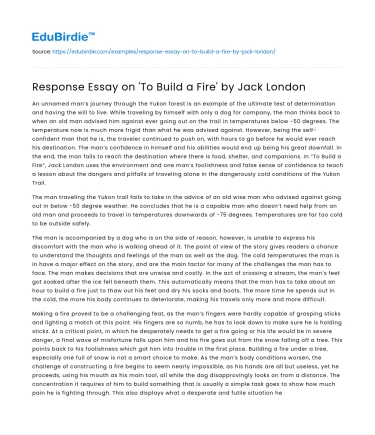An unnamed man’s journey through the Yukon forest is an example of the ultimate test of determination and having the will to live. While traveling by himself with only a dog for company, the man thinks back to when an old man advised him against ever going out on the trail in temperatures below -50 degrees. The temperature now is much more frigid than what he was advised against. However, being the self-confident man that he is, the traveler continued to push on, with hours to go before he would ever reach his destination. The man’s confidence in himself and his abilities would end up being his great downfall. In the end, the man fails to reach the destination where there is food, shelter, and companions. In “To Build a Fire”, Jack London uses the environment and one man’s foolishness and false sense of confidence to teach a lesson about the dangers and pitfalls of traveling alone in the dangerously cold conditions of the Yukon Trail.
The man traveling the Yukon trail fails to take in the advice of an old wise man who advised against going out in below -50 degree weather. He concludes that he is a capable man who doesn’t need help from an old man and proceeds to travel in temperatures downwards of -75 degrees. Temperatures are far too cold to be outside safely.
Save your time!
We can take care of your essay
- Proper editing and formatting
- Free revision, title page, and bibliography
- Flexible prices and money-back guarantee
The man is accompanied by a dog who is on the side of reason, however, is unable to express his discomfort with the man who is walking ahead of it. The point of view of the story gives readers a chance to understand the thoughts and feelings of the man as well as the dog. The cold temperatures the man is in have a major effect on the story, and are the main factor for many of the challenges the man has to face. The man makes decisions that are unwise and costly. In the act of crossing a stream, the man’s feet got soaked after the ice fell beneath them. This automatically means that the man has to take about an hour to build a fire just to thaw out his feet and dry his socks and boots. The more time he spends out in the cold, the more his body continues to deteriorate, making his travels only more and more difficult.
Making a fire proved to be a challenging feat, as the man’s fingers were hardly capable of grasping sticks and lighting a match at this point. His fingers are so numb, he has to look down to make sure he is holding sticks. At a critical point, in which he desperately needs to get a fire going or his life would be in severe danger, a final wave of misfortune falls upon him and his fire goes out from the snow falling off a tree. This points back to his foolishness which got him into trouble in the first place. Building a fire under a tree, especially one full of snow is not a smart choice to make. As the man’s body conditions worsen, the challenge of constructing a fire begins to seem nearly impossible, as his hands are all but useless, yet he proceeds, using his mouth as his main tool, all while the dog disapprovingly looks on from a distance. The concentration it requires of him to build something that is usually a simple task goes to show how much pain he is fighting through. This also displays what a desperate and futile situation he is in. At this point, he is likely to never make it. He still has hours of traveling to go, and his body has all but stopped working. When building a fire goes nowhere, the man runs out of options, and in an act of desperation, goes for the dog, attempting to kill it so he could warm himself in its body. The dog escapes his grasp, as the man is unlikely able to kill the dog under the weak, impaired conditions of his body in the cold. In a last chance of survival effort, the man makes a run for his destination, still hours away, hoping to warm himself by running there. He doesn’t make it far and collapses and dies in the snow a few minutes later. The effects of the cold must have hit his head because he has made many questionable decisions that lead to his death that travellers of the cold climate usually know not to make.
The crucial mistakes made by the man had slowed him down, and he got himself trapped in the middle of the Yukon Forest in the dead of Winter. All of his problems could have been avoided if he had thought ahead, and acted carefully. The man’s efforts to stay alive were admirable, considering the pain and struggle of the situation. His adventure’s outcome was a result of his poor decision-making, and his reluctance to take advice. His false confidence in his abilities and his choice to make a solo endeavor into the dangerously cold wilderness resulted in his demise.
Works Cited
- London, Jack. “To Build a Fire.” 21 Essential American Short Stories, edited by Leslie
- M. Pockell, St. Martins, 2011, pp 64-79






 Stuck on your essay?
Stuck on your essay?

